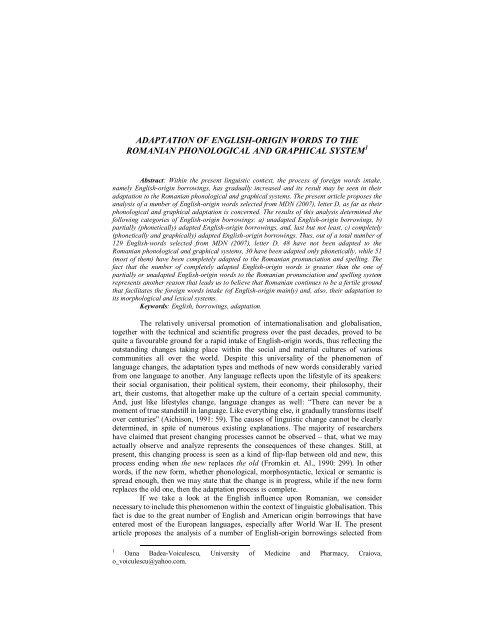language and literature european landmarks of identity
language and literature european landmarks of identity
language and literature european landmarks of identity
You also want an ePaper? Increase the reach of your titles
YUMPU automatically turns print PDFs into web optimized ePapers that Google loves.
ADAPTATION OF ENGLISH-ORIGIN WORDS TO THE<br />
ROMANIAN PHONOLOGICAL AND GRAPHICAL SYSTEM 1<br />
Abstract: Within the present linguistic context, the process <strong>of</strong> foreign words intake,<br />
namely English-origin borrowings, has gradually increased <strong>and</strong> its result may be seen in their<br />
adaptation to the Romanian phonological <strong>and</strong> graphical systems. The present article proposes the<br />
analysis <strong>of</strong> a number <strong>of</strong> English-origin words selected from MDN (2007), letter D, as far as their<br />
phonological <strong>and</strong> graphical adaptation is concerned. The results <strong>of</strong> this analysis determined the<br />
following categories <strong>of</strong> English-origin borrowings: a) unadapted English-origin borrowings, b)<br />
partially (phonetically) adapted English-origin borrowings, <strong>and</strong>, last but not least, c) completely<br />
(phonetically <strong>and</strong> graphically) adapted English-origin borrowings. Thus, out <strong>of</strong> a total number <strong>of</strong><br />
129 English-words selected from MDN (2007), letter D, 48 have not been adapted to the<br />
Romanian phonological <strong>and</strong> graphical systems, 30 have been adapted only phonetically, while 51<br />
(most <strong>of</strong> them) have been completely adapted to the Romanian pronunciation <strong>and</strong> spelling. The<br />
fact that the number <strong>of</strong> completely adapted English-origin words is greater than the one <strong>of</strong><br />
partially or unadapted English-origin words to the Romanian pronunciation <strong>and</strong> spelling system<br />
represents another reason that leads us to believe that Romanian continues to be a fertile ground<br />
that facilitates the foreign words intake (<strong>of</strong> English-origin mainly) <strong>and</strong>, also, their adaptation to<br />
its morphological <strong>and</strong> lexical systems.<br />
Keywords: English, borrowings, adaptation.<br />
The relatively universal promotion <strong>of</strong> internationalisation <strong>and</strong> globalisation,<br />
together with the technical <strong>and</strong> scientific progress over the past decades, proved to be<br />
quite a favourable ground for a rapid intake <strong>of</strong> English-origin words, thus reflecting the<br />
outst<strong>and</strong>ing changes taking place within the social <strong>and</strong> material cultures <strong>of</strong> various<br />
communities all over the world. Despite this universality <strong>of</strong> the phenomenon <strong>of</strong><br />
<strong>language</strong> changes, the adaptation types <strong>and</strong> methods <strong>of</strong> new words considerably varied<br />
from one <strong>language</strong> to another. Any <strong>language</strong> reflects upon the lifestyle <strong>of</strong> its speakers:<br />
their social organisation, their political system, their economy, their philosophy, their<br />
art, their customs, that altogether make up the culture <strong>of</strong> a certain special community.<br />
And, just like lifestyles change, <strong>language</strong> changes as well: “There can never be a<br />
moment <strong>of</strong> true st<strong>and</strong>still in <strong>language</strong>. Like everything else, it gradually transforms itself<br />
over centuries” (Aichison, 1991: 59). The causes <strong>of</strong> linguistic change cannot be clearly<br />
determined, in spite <strong>of</strong> numerous existing explanations. The majority <strong>of</strong> researchers<br />
have claimed that present changing processes cannot be observed – that, what we may<br />
actually observe <strong>and</strong> analyze represents the consequences <strong>of</strong> these changes. Still, at<br />
present, this changing process is seen as a kind <strong>of</strong> flip-flap between old <strong>and</strong> new, this<br />
process ending when the new replaces the old (Fromkin et. Al., 1990: 299). In other<br />
words, if the new form, whether phonological, morphosyntactic, lexical or semantic is<br />
spread enough, then we may state that the change is in progress, while if the new form<br />
replaces the old one, then the adaptation process is complete.<br />
If we take a look at the English influence upon Romanian, we consider<br />
necessary to include this phenomenon within the context <strong>of</strong> linguistic globalisation. This<br />
fact is due to the great number <strong>of</strong> English <strong>and</strong> American origin borrowings that have<br />
entered most <strong>of</strong> the European <strong>language</strong>s, especially after World War II. The present<br />
article proposes the analysis <strong>of</strong> a number <strong>of</strong> English-origin borrowings selected from<br />
1 Oana Badea-Voiculescu, University <strong>of</strong> Medicine <strong>and</strong> Pharmacy, Craiova,<br />
o_voiculescu@yahoo.com.


